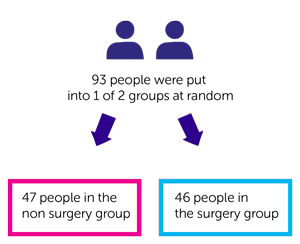A trial looking at surgery to remove cancer that has spread to the lungs in people who have cancer that started in the bowel (PulMICC)
Cancer type:
Status:
Phase:
This trial was done to see if removing cancer that has spread to the lungs improves survival. It was for people whose cancer started in the bowel.
The trial was supported by Cancer Research UK. It was open for people to join between 2010 and 2016. The research team first published results in 2019.
More about this trial
Surgery is the main treatment for bowel cancer. But sometimes the cancer comes back in another part of the body. This is called secondary or metastatic cancer.
If bowel cancer spreads to the lungs, some people can have surgery to remove it. Having part of a lung removed can make breathing more difficult. This can affect people’s quality of life.
When this trial was done, doctors weren’t sure if removing cancer that had spread to the lungs helped people live longer or not.
They wanted to run a large trial to find out whether it’s better for people to have this operation or not. But first they ran a smaller feasibility study, to find out if a larger trial would be possible.
The main aims of this trial were to find out:
- whether it’s possible to run a larger trial looking at removing cancer that has spread to the lungs
- whether removing cancer that has spread to the lungs helps people live longer
- how having this operation affects people’s quality of life
Summary of results
The research team found that people with bowel cancer which has spread to the lungs may not need an operation. And that it was more difficult than they’d hoped to find people who wanted to take part in the trial.
Trial design
This trial was for people who had bowel cancer that had spread to the lungs. They had all had surgery for bowel cancer in the past. They had between 1 and 6 areas of cancer in their lungs.
The research team were hoping that about 300 people would take part in this trial. They decided to stop the trial earlier than planned because they couldn’t recruit people as quickly as they’d hoped.
Some people taking part had surgery to remove the cancer from their lung. And some people had a different treatment to treat the cancer in their lung. This included radiotherapy, or using heat to kill cancer cells (thermal ablation).
A total of 93 people joined the trial. They were put into 1 of 2 treatment groups at random. There were:
- 47 people in the group who didn’t have surgery
- 46 people in the group who had surgery
Results
The research team looked at how well treatment worked.
When they did some analysis in 2020, they found that 63 people had died. The number of people who had died was similar in both groups:
- 33 out of 47 people (70%) in the non surgery group
- 30 out of 46 people (65%) in the surgery group
They also calculated the number of people who would live for at least 5 years after treatment:
- about 3 out of 10 people (30%) who didn’t have surgery
- more than 3 out of 10 people (36%) who had surgery
When they looked at how long people lived for, they found this was also similar in the 2 groups:
- 3.8 years for those who didn’t have surgery
- 3.5 years for those who had surgery
Quality of life
The research team asked the people taking part to fill out quality of life questionnaires before, during and after treatment.
The results showed that there was not much difference between the two groups.
Some doctors think that having surgery to remove cancer will help people’s anxiety, because the cancer has been removed. But the results showed a similar level of anxiety in the 2 groups.
Some people who had surgery found their lungs didn’t work quite as well after the operation. But that was to be expected. Doctors call this a drop in lung function.
No one in either of the groups had any serious side effects or died because of the treatment they were having.
Conclusion
The research team felt the results showed that people with bowel cancer that has spread to the lungs may not need an operation.
They found that people who didn’t have surgery lived longer than they expected. And so there may not be much benefit in having surgery. They suggest that more trials are done to find out more about the possible risks and benefits of surgery for cancer that has spread to the lungs.
The team suggest that people should have treatment for bowel cancer that has spread to lungs. But surgery may not necessarily be the best option. More work needs to be done to decide which treatment is best.
Where this information comes from
We have based this summary on information from the research team. The information they sent us has been reviewed by independent specialists ( ) and published in a medical journal. The figures we quote above were provided by the trial team who did the research. We have not analysed the data ourselves.
) and published in a medical journal. The figures we quote above were provided by the trial team who did the research. We have not analysed the data ourselves.
Recruitment start:
Recruitment end:
How to join a clinical trial
Please note: In order to join a trial you will need to discuss it with your doctor, unless otherwise specified.
Chief Investigator
Professor Tom Treasure
Supported by
Cancer Research UK
NIHR Clinical Research Network: Cancer
Surgical and Interventional Trials Unit, University College London
University of Sussex
Other information
This is Cancer Research UK trial number CRUK/09/022.
If you have questions about the trial please contact our cancer information nurses
Freephone 0808 800 4040






